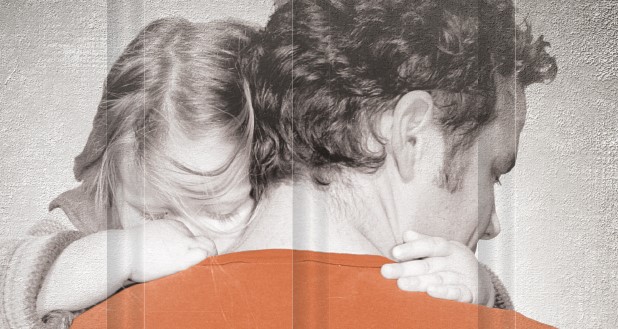
Christmas apart: Families separated by bars
During the holiday season this year, 1 in 28 children will be separated from a parent serving time in prison while millions more parents, siblings, family and…
Kim Grant remembers that day in 1996 when his wife left him and took his three children. He remembers the emptiness of the room and the wide stretch of the floor.
“All day, I’d be on the floor with them, on my back, running around like crazy with the dog like I’m a little kid again,” Grant said. He was in his 20s at the time, spending his days with his kids and his nights trafficking cocaine and marijuana, for which he was eventually arrested and sentenced. He was no stranger to prison at that point in his life. But the separation from his family didn’t end with Grant’s homecoming.
“I guess she just got tired of me,” Grant said. “When I came home, I came home to an empty carpet floor.”
Nearly two decades later, Grant still hasn’t laid eyes on his children. His daughter and son have both graduated from high school by now. “Thank God for Facebook,” he said. It’s the only way he’s kept up with his kids, specifically his oldest daughter. When Grant talks about his daughter, he quotes her words from phone calls.
“Daddy, I want you to be there,” he said she told him before her high school graduation. He never showed up. “Daddy, listen. I’m an adult now. Mom told me everything. I want to hear it from you.”
Grant was too scared to tell his children that he was on drugs, an addict.
Grant’s mother was an addict too, an alcoholic. But that’s not what drove Grant to lose his way, he said. It was that empty floor, and never knowing how to give the kind of love that a parent gives to his child. It was a love that Grant had been missing his whole life, and the emptiness left a void in him that he tried in vain to fill with something else until he realized the truth — he needed to pick up his life where he left off decades ago, before he failed to graduate high school. He needed to get his life back on track, and reconnect with his kids. Only then would he truly be at peace.
The cycle
In South Carolina, Grant grew up under the wing of a Catholic priest who provided for him and his schooling because his mother couldn’t. When that priest passed away, he moved back in with his mother as a public high school student. They were poor, so he turned to peddling drugs to afford the shoes and clothes his peers showed off. He was 18 when he served his first sentence. But Grant still remembers those Christmases spent at the church, with presents and Father’s family. He never knew his own father, and it pains him that he couldn’t be there for his children on their Christmases.
"This Christmas,1 in 28 children throughout the United States will be apart from an incarcerated parent."
Now, Grant says he’s changing that. He’s been out of prison, off drugs, working on getting a job and wants to enroll in courses at Philadelphia FIGHT to earn his GED. His daughter enrolled in college for criminal law.
“She told me, Dad, I’m doing this because of you,” Grant said. “Because all my life you were in jail. I want to try to teach people how not to go to jail.”
Grant’s story is not uncommon. This Christmas, 1 in 28 children throughout the United States will be apart from an incarcerated parent. The Pew Charitable Trusts estimates that 10 million children in the U.S. have experienced parental incarceration at some point in their life.
More than 70 percent of children with incarcerated parents are Black or Latino. When a parent is imprisoned, families often lose significant income, pushing children into deeper poverty. Children with an incarcerated parent are often thrown into instability, especially if their mother is incarcerated. They stay with grandparents, relatives, foster homes and sometimes a mother’s abuser. Children with incarcerated parents grow up with a greater risk of drug and alcohol abuse, and as a result, higher risk of arrest and incarceration.
The statistics surrounding the prison cycle used to fascinate Georgia Lerner, executive director the Women’s Prison Association in New York. Now, she simply hates them.
“I don’t want to accept those numbers because they don’t have to be that way,” Lerner said. “It’s really sad because I don’t think it’s because the mother was in prison that someone is more likely to go to prison.”
Kids need stable households, she said. And they need some kind of relationship with their parent.
"The little things that we generally take for granted in life are the missing pieces for children who have incarcerated parents" — Barbie Fischer
In 2005, the Journal of Family Psychology published a study that examined the parent-child relationship of 94 mothers behind bars. The study found that children who visited their mother more often were less likely to feel fear, loss or shame, while mothers were less likely to feel depressed. A 2012 Minnesota Department of Corrections report found not only a similar positive correlation with visiting a parent, but that inmates whose families visited frequently were less likely to return to prison after they served their sentence.
The family’s sentence
Maintaining a relationship in prison is hard work. Restorative justice practitioner Barbie Fischer knows that first hand. Not only does she work with families and communities affected by a loved one’s incarceration, her own husband has been in prison for 19 years. His extended family hasn’t gathered for a holiday meal in 19 years. This past Thanksgiving was different than the others when she and her husband would fish through the prison vending machines for a Turkey sandwich so they could dine like “normal people.” This past Thanksgiving, Fischer gathered some of her husband’s aunts and cousins.
“Everybody called me later and said they really enjoyed themselves but it was just too hard,” Fischer said. “It was too hard because he’s not there.”
Fischer describes incarceration as an extended loss for an entire family. Her sister’s children have never met their uncle. Children aren’t able to send their parents crafts they made in school and parents can’t send homemade cookies to a state prison because of Pennsylvania’s restrictions — nothing but cards and books, straight from the distributor. Incarcerated mothers can’t pick out a Christmas present. Daughters need to find someone else to walk them down the aisle at their wedding.
“The little things that we generally take for granted in life are the missing pieces for children who have incarcerated parents,” Fischer said.
That’s one of the reasons why Philadelphia FIGHT’s Institute for Community Justice (ICJ) and Eastern State Penitentiary have partnered in a gift drive and party for children of currently or recently incarcerated parents. On Dec. 13, around 30 children and their caregivers gathered at ICJ to decorate holiday cookies, play games, and take home a few wrapped toys donated by visitors at the historic Eastern State Penitentiary.
Kai Yohman, Operations Coordinator at ICJ, said that the party is an opportunity for families to have fun around the holidays.
“I think there’s really never enough being done for these communities, so we just want to give them a day to enjoy themselves,” Yohman said.
“When we think about the criminal justice system, we think about all the people in there and we don’t necessarily think about the folks they had to leave behind, whether that’s family members or children, communities, places of employment,” Yohman said. “I think we as a society we don’t think of the way and the impacts of one person being incarcerated can have on an entire community.”
This year, there are no evening visiting hours on Christmas Eve at the prison where Barbie Fischer’s husband is incarcerated. Fischer won’t be seeing her husband for Christmas all because the day falls on a Thursday. Many children won’t see their parents if caregivers decide to skip visiting hours, or don’t have transportation to a prison that is 50 minutes or five hours away.
Another kind of ‘punishment’
Georgia Lerner of the Women’s Prison Association said that “tough on crime” is a great mantra in political campaigns, but few policy makers bring up what actually works to reduce crime and reduce the United States’ incarceration rate, one of the highest in the world. What works, Lerner said, is addressing the root of why people commit crimes.
“If someone’s arrested for selling drugs, we want the person to stop selling drugs. We punish the person, we send them to jail, it costs a lot of money, but in most cases sending somebody to jail doesn’t do anything to stop them from selling drugs later. It doesn’t get at the underlying reason that the person is selling drugs,” Lerner said. Perhaps a drug treatment program is a more appropriate response, Lerner said. But if the root issue is post-traumatic stress disorder from years of abuse, drug treatment still might not guarantee change.
“If we take these drugs away and we don’t have something else to treat the other issues associated with the mental illness, then she’s left with nothing and has no tools to deal with her symptoms,” Lerner said. “We have to really try to understand why somebody is committing the crime if we want to reduce the chances they’re going to do it again.”
In the United States, 67 percent of released prisoners in 2005 were arrested within three years of their release, and 76 percent were arrested again within five years, a recent Bureau of Justice Statistics study found. Pennsylvania’s recidivism rate is lower, but still 40 percent of those released in 2010 were incarcerated before 2014.
Part of the problem is that economic hardships don’t disappear in prison. A criminal record often makes matters worse, as it’s more difficult to find a job and shelter, not to mention years of lost income. But it’s not just the prisoner who pays the cost.
Pennsylvania spends more to house a prisoner in a year than many of the state’s families earn annually — $32,986, according to the National Institute of Corrections, although some estimates put that pricetag past $40,000. The majority of Pennsylvania households earn below $53,000 a year. In Philadelphia, that media drops to $37,000.
Barbie Fischer said that if her husband wasn’t incarcerated, he could work, pay taxes, support the local economy by spending money and save taxpayers $44,000 a year. Right now he’s earning one of the highest prison wages — $0.36 an hour.
Organizations like the Women’s Prison Association advocates for alternatives to incarceration that are proven to successfully reduce recidivism and improve entire communities. So far, 40 women have been sentenced to Justice Home, a WPA program to assess women individually and address the root cause of her crime while avoiding incarceration. Initially, judges hesitated to avoid prison sentencing in these cases. They didn’t want to “let women off the hook.” But Lerner said that anyone who thinks it’s easier to be in the community than to go to jail is wrong. She said that women in the program have to look internally and face the fears they’ve been running away from their entire lives.
“Ultimately, we want a woman to be able to look in a mirror on any given day and be comfortable with accepting who she is and how she got to that day — to be able to account for herself so that she’s free to move forward and have a productive and happy life,” Lerner said.
Coming home for Christmas
Barbie Fischer won’t be seeing her husband on Christmas this year as she’ll be traveling to be with family. Kim Grant will be spending his holiday in Philadelphia with his girlfriend of 9 years. He hasn’t heard from his daughter in months, but is hopeful that things will turn out right in the end. Philadelphia native Tarrence Swartz will be spending his Christmas with his new girlfriend and her 8-year-old daughter, who he refers to as his stepdaughter.
Just a week before Christmas, Swartz dropped his stepdaughter off at school and recalled meeting his own biological father for the first time when he was 8 years old, when his grandmother brought him to prison to see him.
“It threw me off seeing him in jail. I was looking like, why am I here,” Swartz said. “She told me, ‘You’re here to see your dad.’ See my dad, but my dad’s at home.”
“I wish I’d never met him. I had to because my Grandmom told me it was only right that I knew who he is,” Swartz said. “I watched my dad go in and out of jail my whole life. I watched my stepdad go in and out of jail my whole life.”
His father, stepfather and “hanging around with the wrong crowd” played a leading role in “corrupting” Swartz’s mind, he said, turning to the streets to sell drugs and make money, and eventually ending up behind bars in 2006 when he was 22 years old.
“It was hard for me, being locked up, being away from my friends and family,” Swartz said. “Especially my family, that was my big support system right there.”
In 2008, Swartz really felt the separation at Thanksgiving. He broke down and cried on that day, and again on Christmas, but not on New Year’s Day — he was used to it by then.
Phone calls were painful. Swartz’s niece asked where he was and when he’d visit. In February 2009, he went to court. His sentence was over.
“When the judge told me I was going home, I walked right up on my sister and niece, didn’t even tell them I was coming home, I just walked right up on them and they were happy to see me,” Swartz said. “That was the best moment of my life. I made a promise to myself, I will never go back. That’s the last place that I want anybody to see me at. And I kept my word.”
It will be Swartz’s first Christmas with his new family, but certainly not his last, he said. “You can’t change what happened,” Swartz said. “The only thing I can do is try to change for the best.”











LEAVE A COMMENT:
Join the discussion! Leave a comment.